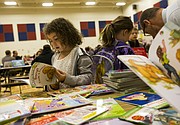A Vision to help kids read better
Art projects lined the tables spread across the gymnasium in Bryan Elementary School. The projects acted as centerpieces while parents and their children ate breakfast and read together at the annual “Buddy and a Book” breakfast.
Phoebe Fiacco, 6, listened attentively to her father, Nick, as he read to her from her favorite book, Strawberry Shortcake. Fiacco is one of the many parents in the Coeur d’Alene community who understands literacy is key to Phoebe’s and her peers’ future success.
Thanks in large part to a $600,000 grant, the Coeur d’Alene community and school district teamed up to create an initiative known as “Opening Books, Opening Doors” to improve reading proficiency in kindergarten through third-grade students.
Several organizations throughout the community came together Thursday morning at Bryan Elementary to launch the initiative aimed at helping kids read at grade level by the end of third grade.
The initiative’s roots formed in CDA 2030’s Vision Project. The Vision Project identified education and learning as a focus for creating a bright future for the greater Coeur d’Alene area. One strategy for improving that focus, known as educational excellence, highlights exceptional literacy as a factor in making the Coeur d’Alene school system one of the best in the nation.
A Harvard University study shows that children who don’t read proficiently by the end of third grade are four times more likely not to graduate high school.
“Opening Books, Opening Doors” has four parts meant to improve student literacy: kindergarten readiness, quality teachers in a literacy-rich environment, parent engagement, and out-of-school learning.
“We’ve talked a lot about really focusing on kindergarten readiness and specifically targeting 4-year-olds,” said Anna Wilson, the district’s director of title programs. The district will work with United Way and the Community Library Network to target those kids.
“United Way currently has a Ready-For-Kindergarten program, which is a birth-to-age-5 program that they hold in the three local communities of Coeur d’Alene, Post Falls and Rathdrum,” Wilson said.
The University of Idaho also played a key role in determining effective ways to improve not only reading fluency, but also comprehension in kindergarten through third-grade classrooms.
Dr. Charles R. Buck, University of Idaho associate vice president, said UI will provide overall management of the program along with other community collaborators.
Buck said the university will run a research project alongside the initiative through the school’s College of Elementary Education to determine the most successful methods.
“One can increasingly argue that achieving that level of literacy is a civil right, not just for people and kids in Coeur d’Alene, but for kids around the world,” Buck said.
The Inland Northwest Community Foundation (INWCF), a co-funder of the initiative, supported Buck’s argument that literacy is a civil right with statistics showing that more than 65 percent of all state and federal corrections inmates are classified as low literate.
This issue really hits home, considering in 2013, Idaho had the eighth-highest incarceration rate in the nation. The Idaho Reading Indicator, a statewide reading assessment for kindergarten through third grade, found that in the fall, 35 percent of kindergarten through third-grade students in the Coeur d’Alene School District are not proficient readers. That’s 1,179 students who cannot read at their grade level.
In the spring, that number drops to just 420 students, or 15 percent, of all 3,372 kindergarten through third-graders in the district who don’t read proficiently. Then in the fall, the number of students below proficiency rises again. This phenomenon is known as the “summer slide,” and it’s one of the reasons the initiative focuses on out-of-school learning.
Illiteracy not only impacts the students, but the whole community. It creates a gap between the workforce and the needs of businesses, leading to lost earnings, taxes, and productivity. Dennis Durfee, Mountain West Bank’s chief financial officer, said his company chose to co-fund the initiative because of the impact the initiative will have on the community.
“It’s a little different than some donations. It feels a bit more like an investment,” he said. “This isn’t really based on how much visibility you’re going to get; it’s about the community.”
INWCF and a group of five local organizations agreed to grant $600,000 over three years to the University of Idaho to promote exceptional literacy.
Mark Hurtubise, president and CEO of the Inland Northwest Community Foundation, agreed that literacy is essential, but he also supported the initiative for practical reasons.
“It was a topic that was visible, it could be measured, and it has the potential to be sustainable because the school district and the community made a commitment to this in the long term,” Hurtubise said.
Because childhood literacy is a big factor in determining a student’s success, the leaders of the “Opening Books, Opening Doors” initiative emphasized its importance in improving the community.
Hurtubise also stressed the initiative could grow beyond Coeur d’Alene.
“This district and the community have an opportunity to be a model for the entire state,” Hurtubise said. “Once the meter starts moving in a positive direction, it could replicate throughout the entire state. It could affect how tax dollars are spent on schools in the future.”



